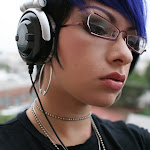
You say that the album is an homage to Brian Eno, Tangerine Dream and Steve Reich. How have they influenced you?
Brian Eno, Tangerine Dream, Steve Reich – I also think of David Behrmann, Alvin Lucier, and many more – are really great composers and very important to me. So, yes, you can consider Hanging Masses to be a sort of homage to them. I think they have explored every area of electronic music. Today, we are only repeating their work with faster and more modern tools than they had. I don’t think we’re creating anything new. We’re just the new generation, following our mentors.
If anything, your music has become more mellow and reflective since your last studio album five years ago. How would you say that your music has changed in that time?
It‘s not more mellow, it‘s more personal, I guess. Hanging Masses is a very personal album. I mean, my first album, Phonic Peace, is interesting for people who want to have an easy ‘starter’ in Ethno-Chillout. It was a very ‘polite’ album. Too many samples, I guess… But many people didn’t understand Phonic Peace when they compared it to the tracks I released in that same period, 2004-2005, which were more downtempo/ambient. For example, “Audio Deepest Night”, “Blue Embers”, “Hawaï Transit” and “Asian Morning”. And I clearly understand that today. But I have no regrets about Phonic Peace. I was so proud of it! Hanging Masses is so different, you’re right. I didn’t use any samples, except for a few spoken word here and there. And I used many different types of synths. It’s a real winter album. Some of the tracks were made in the mountains. The climate is so different that you can almost feel the snow very near to you.
[ - s n i p - ]
Read the entire interview by Tigon on Headphone Commute
See also Tigon's review of Hanging Masses
Saturday, March 27, 2010
Two and a Half Questions with Cell
Subscribe to:
Post Comments (Atom)


No comments:
Post a Comment